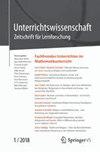Effects of a digital support tool on student teachers’ knowledge about, assessment of, and feedback on self-regulated learning
Q2 Social Sciences
引用次数: 0
Abstract
Abstract In this quasi-experimental field study, we investigated the effects of a digital support tool on knowledge about, assessment of, and feedback on self-regulated learning (SRL). Student teachers ( N = 119) took the roles of learners and teachers. As learners, they wrote learning journals and received feedback on the strategies they had used. As teachers, they assessed a peer’s learning strategies elicited in the learning journals and provided feedback. A digital tool supported the participants in their role as teachers by providing additional assessment support (yes/no) and feedback support (yes/no). Assessment support was realized with rubrics, feedback support was realized with sentence starters. Our results indicated that declarative and self-reported knowledge about SRL increased in all groups. Assessment support did not foster assessment skills, but feedback support fostered the quality of the peer feedback and feedback quality in a standardized posttest. High feedback quality, in turn, predicted learners’ application of organizational (but not metacognitive) strategies. We conclude that the combination of writing learning journals and providing peer feedback on SRL is a promising approach to promote future teachers’ SRL skills. Digital tools can support writing the feedback, for example, by providing sentence starters as procedural facilitators. Such support can help teachers supply high-quality feedback on SRL, which can then help learners improve their SRL.数字化支持工具对实习教师自我调节学习知识、评估和反馈的影响
摘要在这项准实验研究中,我们调查了数字支持工具对自我调节学习(SRL)的认识、评估和反馈的影响。实习教师(N = 119)分别扮演学习者和教师的角色。作为学习者,他们写学习日志,并收到关于他们使用的策略的反馈。作为教师,他们评估同伴从学习日志中获得的学习策略,并提供反馈。一个数字工具通过提供额外的评估支持(是/否)和反馈支持(是/否)来支持参与者作为教师的角色。评价支持通过标题实现,反馈支持通过句子启动器实现。我们的研究结果表明,在所有组中,陈述性和自我报告性的SRL知识都有所增加。评估支持并没有培养评估技能,但是反馈支持促进了标准化后测中同伴反馈和反馈质量的质量。反过来,高反馈质量预测了学习者对组织(但不是元认知)策略的应用。我们认为,结合撰写学习日志和提供关于SRL的同伴反馈是一种有希望提高未来教师SRL技能的方法。数字工具可以支持撰写反馈,例如,通过提供句子开头作为程序促进者。这种支持可以帮助教师提供高质量的语言学习反馈,从而帮助学习者提高语言学习水平。
本文章由计算机程序翻译,如有差异,请以英文原文为准。
求助全文
约1分钟内获得全文
求助全文
来源期刊

Unterrichtswissenschaft
Social Sciences-Education
CiteScore
2.10
自引率
0.00%
发文量
19
期刊介绍:
Unterrichtswissenschaft – Zeitschrift für Lernforschung ("Journal for Teaching and Learning") publishes research on learning and instruction in pre-school, school, higher education, occupational settings and various informal learning environments. The journal presents theoretical approaches and empirical research findings to facilitate the advancement of further research and evidence-based practice in education. Unterrichtswissenschaft is therefore indispensable for researchers and students in the fields of transfer research, teaching quality and didactics.
Unterrichtswissenschaft publishes original empirical studies, reviews, and theoretical articles in German and English. All articles are subject to double-blind peer review in order to meet the highest quality standards. Every issue contains a topical focus as well as unsolicited submissions, which are complemented by hot topic contributions.
The journal has an international audience with a special focus on German-speaking countries. It is one of the three most-cited German journals in educational research as identified by a Cited Reference Search in Web of Science, PsychInfo, and Harzing''s Publish or Perish (1999-2010). About 50 % of the references in Web of Science can be found in English-language publications.
 求助内容:
求助内容: 应助结果提醒方式:
应助结果提醒方式:


